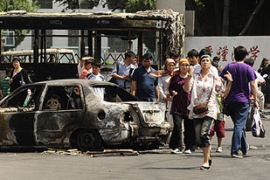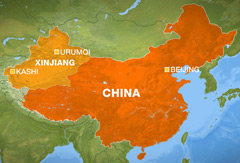China arrests hundreds after unrest
Police arrest 1,500 people and locks city down after Xinjiang clashes leave 150 dead.

Exiles reject blame
|
Follow Al Jazeera China correspondent Melissa Chan.
|
Chinese state media said thousands of protesters fought with police and set fire to vehicles in Urumqi on Sunday after a demonstration against the government’s handling of an industrial dispute turned violent.
While Urumqi was said to be calm on Monday, reports suggested unrest could be spreading to other parts of the vast Xinjiang region.
According to Xinhua police dispersed around 200 people on Monday evening who had gathered outside the main mosque in the ancient Silk Road city of Kashgar.
| In depth |
|
|
The Chinese government has blamed Uighur exiles for stoking the unrest, singling out Rebiya Kadeer, a Uighur businesswoman who was jailed for years in China before being released into exile in the US where she now heads the World Uighur Congress, for “masterminding” the unrest.
“Rebiya had phone conversations with people in China on July 5 in order to incite, and websites such as Uighurbiz.cn and Diyarim.com were used to orchestrate the incitement and spread of propaganda,” said Nur Bekri, the governor of Xinjiang.
Wang Lequan, the region’s senior Communist party official, said “we must tear away Rebiya’s mask and let the world see her true nature”.
| Xinjiang and the Uighurs |
|
|
But Kadeer, a 62-year-old mother of 11, rejected the accusations on Monday, saying from Washington that they were “completely false”.
“I did not organise any protests or call on the people to demonstrate,” she said.
Explaining to reporters that she called her brother in Xinjiang when she learnt of the violence in Urumqi to warn her 40 relatives in the region to stay away from the demonstrations, she said: “A call I made to my brother does not mean I organised the whole event.”
Activists say the clashes started when armed police moved in to break up a peaceful demonstration called after two Uighur workers at a toy factory in southern China were killed in a clash with Han Chinese staff late last month.
Kadeer said the protests in Urumqi started peacefully.
“They were not violent as the Chinese government has accused. They were not rioters or separatists,” she said.
She did, however, condemn “the violent actions of some of the Uighur demonstrators”, saying her organisation supported only peaceful protests.
Alim Seytoff, a spokesman for the Kadeer’s World Uighur Congress pressure group, told Al Jazeera that the clashes broke out when armed police and armoured vehicles moved in to forcefully break up the demonstration, opening fire on protesters.
“It is common practice for Beijing to blame outsiders for any problems in Xinjiang, as it does with problems in Tibet,” he said.
“The root cause of the problem is really the Chinese government’s long-standing repressive policies.”



